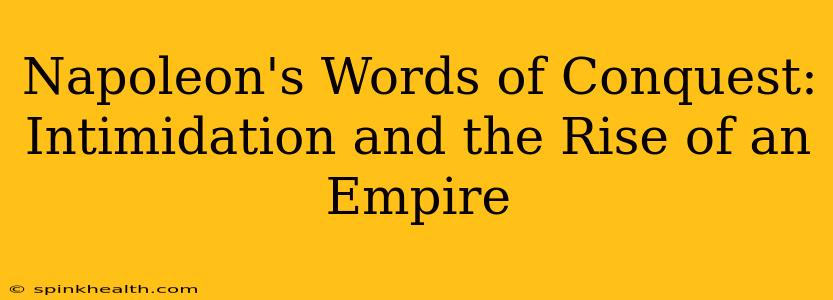Napoleon Bonaparte. The name itself conjures images of sweeping military victories, audacious strategies, and an unyielding ambition that reshaped the map of Europe. But beyond the battlefield prowess, lay a mastery of words – a potent weapon he wielded with chilling effectiveness to intimidate, inspire, and ultimately, conquer. This wasn't simply about issuing orders; it was about crafting a narrative, building a persona, and using language to bend the will of nations. This exploration delves into how Napoleon's carefully chosen words fueled his rise to power and cemented his legacy as one of history's most formidable figures.
How Did Napoleon Use Propaganda?
Napoleon understood the power of propaganda long before the term gained widespread use. He wasn't just a military strategist; he was a master of public relations, carefully cultivating his image and controlling the narrative surrounding his actions. He used bulletins, speeches, and even carefully placed stories in newspapers to shape public opinion, both within France and across Europe. He portrayed himself as a champion of the revolution, a defender of liberty, and a bringer of order – a carefully constructed image that resonated with a populace weary of chaos. This carefully crafted persona, disseminated through controlled messaging, played a crucial role in maintaining his grip on power and securing the loyalty of his troops. His words were designed to inspire unwavering devotion, fostering an almost cult-like following.
What Was the Impact of Napoleon's Speeches on His Soldiers?
Napoleon's speeches to his troops were legendary, infused with a potent blend of patriotism, ambition, and unwavering confidence. He didn't just give orders; he painted vivid pictures of glory, emphasizing the honor and rewards awaiting those who fought under his banner. His words stoked the fires of loyalty and instilled a fierce sense of camaraderie amongst his soldiers. He tapped into their desires for recognition, advancement, and a share in the spoils of war. This masterful manipulation of language transformed ordinary soldiers into fiercely loyal and highly motivated fighting men, willing to endure incredible hardships in pursuit of his vision. Examples abound of his inspiring addresses before pivotal battles, transforming potential doubt into unwavering commitment.
What Kind of Language Did Napoleon Use?
Napoleon's language was characterized by its directness, its simplicity, and its emotional impact. He avoided overly complex vocabulary, preferring short, powerful phrases that resonated deeply with his audience. He understood the power of evocative imagery, painting vivid pictures of triumph and defeat to galvanize his troops and intimidate his enemies. He employed a style that was both commanding and inspiring, capable of moving men to tears or driving them to acts of incredible bravery. His words often served to create a powerful sense of shared destiny and purpose, binding his army together in a common cause.
What Were Some of Napoleon's Most Famous Quotes?
Many of Napoleon's most famous quotes are short, memorable pronouncements that encapsulated his strategic thinking and personal ambition. Phrases like "A leader is a dealer in hope" spoke volumes about his understanding of the human psyche and the role of leadership in inspiring action. Others, like "Impossible is a word to be found only in the dictionary of fools," demonstrated his unwavering belief in his own capabilities and the power of relentless determination. These concise yet potent declarations were more than just words; they were carefully constructed pronouncements designed to project strength, inspire confidence, and shape the perception of his image.
How Did Napoleon Use Intimidation in His Communication?
While inspiration was a key element of Napoleon's communication strategy, he also masterfully employed intimidation. His letters to opposing monarchs often dripped with thinly veiled threats, showcasing his unwavering resolve and relentless ambition. He used language to project an image of invincibility, leaving his adversaries feeling pressured and demoralized even before a battle began. This psychological warfare, waged through carefully chosen words, significantly weakened his opponents' resolve and contributed significantly to his early successes.
Conclusion: The Power of the Pen (and the Spoken Word)
Napoleon's legacy extends beyond his military conquests. His mastery of language, his ability to inspire loyalty and sow fear through carefully crafted words, serves as a testament to the power of communication in shaping history. He understood that words could be weapons as powerful as any cannon, and he wielded them with the skill of a master strategist, leaving an indelible mark on the world not only through his actions but also through his words. His use of intimidation, coupled with his inspiring pronouncements, solidified his image as a figure of both power and charisma, a testament to the potency of rhetoric in the forging of empires.

